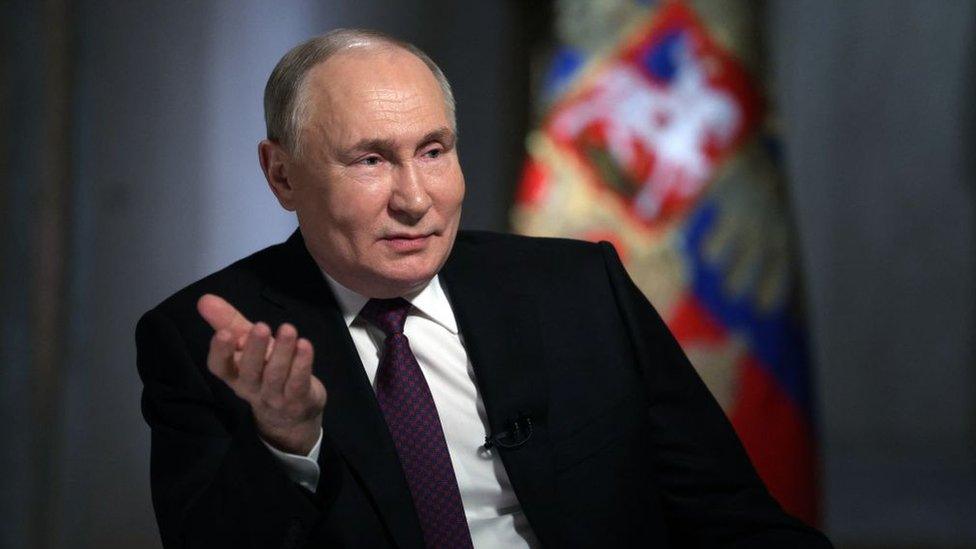Vote rigging fears ahead of Russian poll
- Published
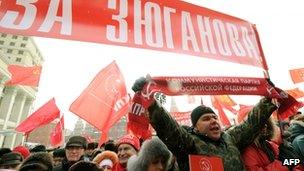
Vote rigging allegations have sparked anger in Russia
Thousands are set to protest in Moscow against fraud in Russia's recent parliamentary election. With a month to go before a presidential poll in which Vladimir Putin tries to return to his old job, Daniel Sandford asks why so many are convinced his party rigged December's vote.
Pavel Vasiliyev sits down at his kitchen table with the two slips of paper that represent his total disillusionment with his country's electoral system.
His luxury flat has a stunning view over a wintry Moscow. A successful 35-year-old banker, he has done well in Mr Putin's Russia.
But feeling something was not right last year, he volunteered to be an observer in the parliamentary election. What he subsequently saw was far worse than he had imagined.
"I was not expecting any fraud, any falsification," he remembers.
All day he urged the local election commission to do everything by the book, and all day they resisted, eventually expelling him from the polling station.
"I actually laughed first of all," he said of the expulsion. "I thought: 'Come on, you cannot be doing that, that's totally against the law.'"
In his absence, a colleague filmed and photographed the chairwoman of the commission filling in the final tally of the votes on the "protocol" form.
Then the chairwoman disappeared for three hours with all the ballot papers.
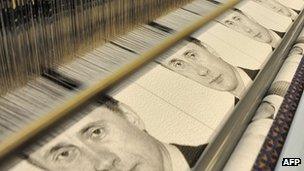
Weaving a web - Mr Putin is planning to return as Russia's president
When she returned, she had a new protocol. But this one had 80 votes more for the Mr Putin's United Russia party, and 20 votes less for each of the four main opposition parties.
He has the two slips of paper in his kitchen now - the "before" and "after" protocols - his personal evidence of the institutional conspiracy to cheat at Russia's parliamentary election.
"I really discovered during that day that the system really disregards, opposes and really cheats on the voters. I didn't give up. I will definitely go to observe on the 4th of March in presidential elections. And I would like to see these things change, I really would."
Riding the carousel
Simply altering the final result at a polling station is perhaps the most blatant form of cheating, but Russia's electoral fraudsters can be much more inventive than that.
Take the "carousel", a system that involves groups of people touring round dozens of polling stations voting at every one.
Ksenia Borovinskaya and her boyfriend Anton Lugovoi are students. They were approached at the last minute to join a "carousel" voting again and again for United Russia.
They decided to go along with it, but arranged for an undercover journalist to film the whole thing.
They were handed a list of more than 40 polling stations to visit just in one small part of Moscow, and they were given little apple stickers for their passports.
"We would go into each polling station, and go to table one or two, and show our passports," Ksenia recalled.
Anton picked up the story.: "When the person saw the apple sticker there, he knew exactly what to do, and just gave us a ballot paper without the usual explanation about how to vote," he said.
"What happened was absurd. One school had three polling stations and we voted at all three. We passed the observers as we walked from one polling station to another, they saw us voting and none of them said anything. It was all very weird."
Cooking the books?
Working out the overall effect of the fraud is difficult, but Sergei Shpilkin, a scientist and statistician has become something of an expert.
He says that, when the results from individual polling stations are plotted on a graph, the fraud is startlingly clear.
For example, there are a surprising number of places where the share of the vote for United Russia is exactly 60% or 65% (but not 62 or 63%.) It is an obvious sign of outside interference - human beings like nice round numbers.
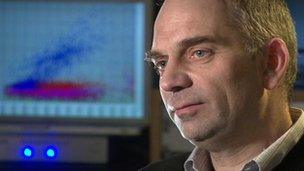
A scientist and statistician, Sergei Shpilkin says the numbers reveal the scale of deceit
By looking at the unusual voting patterns, and removing anomalies, he has come up with an estimate of the real result.
"The official result of United Russia was 49.3%," he said. "But my statistical analysis gives something between 34 and 39%. The most conservative estimate is 39%. So 10 percentage points is basically cheating, and it means that United Russia has no majority in the Duma."
Even Levada, one of the officially recognised opinion polling agencies concedes that the election result was tainted by fraud.
Levada's Director, Lev Gudkov said: "We think the scale of fraud was the same as during previous elections - about 5 to 6% in general. In Moscow we estimate 14% fraud."
It means Mr Putin should not have a parliamentary majority.
The response of the political establishment to the allegations has varied over the weeks since the election.
At first they were dismissed, then a few cases were taken up by the prosecutor, though only a fraction of the complaints.
This week Vladimir Putin said he could not rule out that "administrative resources" had affected the election result, but insisted that it varied greatly from region to region.
- Published10 December 2011
- Published7 December 2011
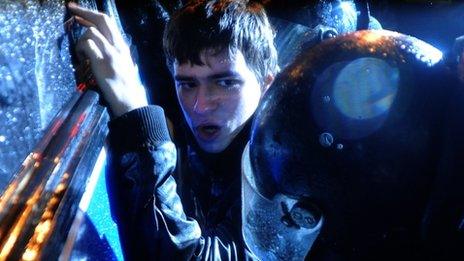
- Published10 December 2011
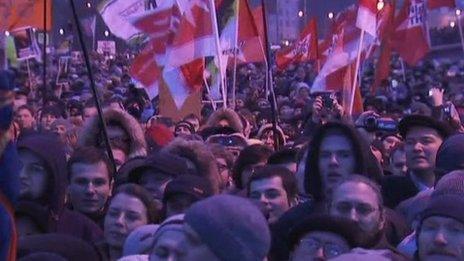
- Published17 March 2024
